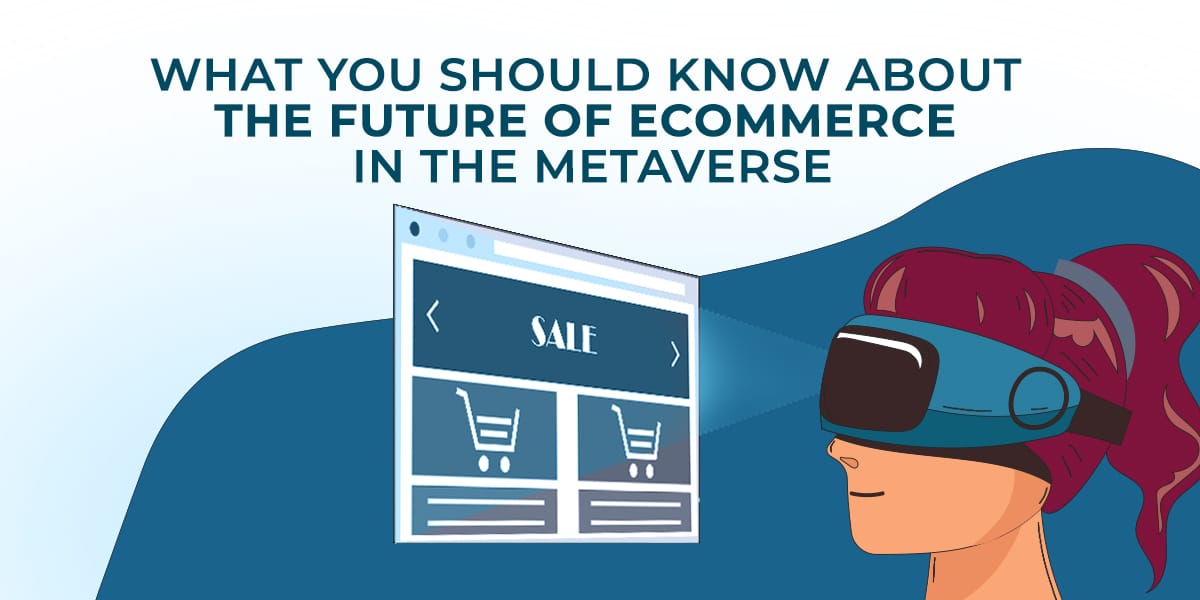What You Should Know About the Future of eCommerce in the Metaverse
Consumerism is here to stay, whether you like it or not. If you’re reading this article, we’re going to assume you’re not too upset by that as long as profits keep coming in. Business owners and marketers alike must adapt to the newest trends or be left behind, so it’s in your best interest to stay in the loop. Would you laugh at someone for recommending that you start looking into virtual reality eCommerce strategies? We wouldn’t blame you if you did, but that doesn’t mean they wouldn’t have a point. As virtual reality solidifies and grows, so will the opportunities that come with it. A recent study published by Gartner predicted that 25% of people would be spending an hour a day in the Metaverse by 2026.
With all this talk about the future Metaverse, what might eCommerce look like down the road? In this article, we’re going to cover the Metaverse and eCommerce. Specifically, what the Metaverse is, how it could evolve, and eCommerce’s place on this new frontier. Let’s dive right in!
What is the Metaverse?
In short, the Metaverse is the combined world of virtual reality. While clunky headsets with limited capacity for games and activities are currently the only option, Metaverse technology is progressing at a rapid pace. There are already virtual workspaces, social meetups, live music, and more happening in virtual reality.
When people reference the Metaverse, they are referring (more often than not) to the general idea of interconnected virtual spaces that become adopted by the mainstream population. Just like it once seemed foolish, most people now spend hours on the internet throughout their day. The age of regularly spending time in a virtual space is fast approaching!
You may have heard of Mark Zuckerberg’s newest promise that goes by this same name: the Metaverse. The company formerly known as Facebook is developing what seems to be the pioneering virtual reality framework. Other companies are making similar attempts as well, so it is hard to say if any companies today will create the “ultimate framework” of the virtual reality Metaverse.
The concept of a Metaverse is somewhat solid, but how it will look and feel is still quite fuzzy. Even now, different virtual reality applications can feel drastically distinct from one another. This isn’t even to mention that there will likely be many different virtual communities building off one another. The Metaverse is exciting because of how open-ended and opportunistic it could be.
How is the Metaverse Expected to Evolve?
As mentioned previously, the Metaverse is already beginning to grow through the efforts of different developers and studios. Despite this, it is far from its final form. In fact, the Metaverse is likely impossible to truly imagine without seeing it for yourself. Like any emerging space, it will continue to evolve and mold into what we demand as consumers.
Let’s take the current state of virtual reality. As it stands, there are plenty of forward-thinking applications which have been built. Facebook is testing out virtual workspaces, and VRchat (social meetup spaces with custom avatars) regularly reaches over 21,000 active users. Development teams are beginning to push the limits, and the usage of virtual reality spaces will only become more common.
What might the Metaverse look like down the road? There are countless ways this could play out. A realistic assumption is that this interconnected web of virtual spaces will merge together to create a network of sorts.
Imagine something much like the internet, where you have accounts and pages on different sites that you can jump between at will. There are even some profiles (such as a Google profile, for example) that you can use to represent yourself across multiple websites. The Metaverse could grow into something similar, with many virtual spaces and programs that continually grow more integrated with each other.
While the Metaverse will begin as an isolated virtual space, it will quickly grow into a massive platform where you travel between different virtual spaces to access what you need. Imagine finishing up a work meeting in a virtual board room just to teleport to a tennis court and meet up with some friends. If you’re tired afterward but the party isn’t over, you could even invite them over to your virtual place to relax and talk!
How Will the Metaverse Affect eCommerce in the Future?
If it isn’t clear by now, there are a wide variety of reasons to get involved in the Metaverse as a business owner or marketer. While it is certainly a niche market at the moment, it is clear to see how this could be the next direction we move in as a society. Just as digitizing everything became the norm, so will being active in virtual spaces.
You can probably see where this is going. If people continue to adopt virtual reality, then businesses will follow suit. As people put down their phones and stop watching TV to engage with others in virtual reality, marketing will change. The Metaverse and eCommerce are going to evolve to fit the consumer lifestyle.
In a way, eCommerce will change forever. In another way, it will stay the same as it always has!
When eCommerce emerged from the internet to one-up physical locations, the way businesses approached customers online had to change. Similarly, companies will need to create brand-new ways of displaying products and keeping visitors in their virtual stores. Finding VR-native ways of attracting and retaining customers will be a new challenge for brands.
In another sense, the move to virtual reality could present more effective ways to connect with consumers. For example, publicity events can be open to people from all geographical locations. Pop-up shops and sponsored afterparties will be easier than ever. If you are selling certain products, you may be able to arrange virtual demos or allow customers to try on accessories.
The Metaverse will not change the principles and fundamentals of eCommerce, but it will certainly affect the ways it can be utilized. Human nature and the reasons behind marketing won’t change, but the form it takes could be incredibly different 5 years down the road in a virtual universe.
How to Prepare an eCommerce Store for the Metaverse
Because a mature and popular Metaverse is still years away, there is slightly less of a scramble to pivot your marketing strategies. Until we truly know people’s habits in virtual reality it will be difficult to craft a great marketing strategy. In the meantime, there are a few concepts that you should get a good grasp of as we see virtual reality taking off:
Blockchain Technology
Blockchain technology might not be the first thing you imagine when you hear “the Metaverse,” but it will be a major part of many marketing campaigns and product launches. This is because blockchain technology is the basis for many virtual assets. A blockchain keeps track of who owns what NFT, and who just paid you in Bitcoin. The variety of uses in a digital world means that understanding and keeping up with this tech is worth your time.
Online Communities
Many smaller brands have leaned harder into online communities as a way of connecting with their customers. For example, a cigar shop may run a private server on Discord for customers to hang out and chat. In the Metaverse the shop could host a virtual lounge for eCommerce customers to mingle and relax. If Facebook Groups are still going strong, you can guarantee that virtual hangouts will become popular as well.
Professional Marketing Agencies
Whether you are trying to arrange a billboard next to the freeway, you can upgrade your search engine optimization. Moreover, create a Metaverse marketing strategy, marketing professionals can save you time AND money. These are the people who spend all day researching the latest and greatest marketing trends!
No to The Quo marketing is the go-to agency trusted by companies of all shapes and sizes. It boasts a team of experts in their fields who deliver top-notch results. Over the last five years, N2Q has grown. Started from a kitchen-based social media management company to a full-service digital marketing agency in downtown Seattle.
To see how No to The Quo could up your game, set up a free quote here!
E-Commerce No To The Quo



